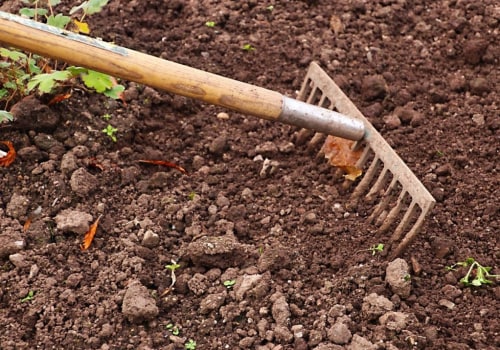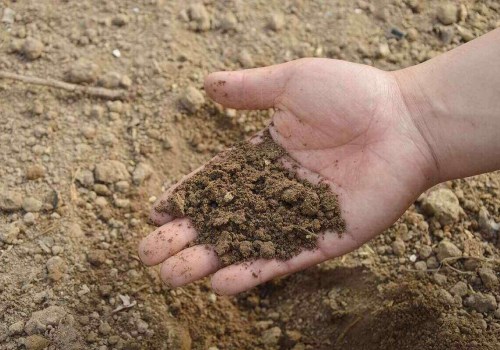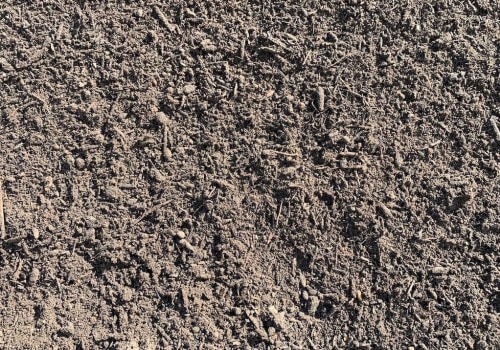Are you looking for the best inorganic soil amendments to help your garden flourish? We've put together this guide to help you find the perfect amendments for your soil. We'll discuss the types of inorganic soil amendments available, the benefits and drawbacks of each, and where to buy them. Read on to learn more about how to make the most of your soil and create a healthier garden.
Inorganic soil amendments
are materials that are added to the soil to improve its structure and fertility. Examples of inorganic amendments include rock phosphate, gypsum, limestone, and sulfur.These amendments can help improve the soil's aeration and water-holding capacity, as well as increase nutrient availability for plants. The benefits of using inorganic soil amendments include improved drainage and reduced compaction, increased water-holding capacity, and reduced levels of salts and other compounds that can be damaging to plants. Inorganic soil amendments can generally be found at garden centers, nurseries, hardware stores, and home improvement stores. They can also be purchased online from various retailers.
When purchasing inorganic soil amendments, it is important to look for ones labeled as organic or all-natural. Additionally, labels should be read carefully to make sure the right amendment is being purchased for the soil type. When using inorganic soil amendments, it is essential to follow the instructions on the packaging. This will help ensure that the product is used safely and correctly, and that the user gets the most out of their purchase.
Using Inorganic Soil Amendments Safely
Inorganic soil amendments can be a great way to improve the quality of your soil. But, it is important to use them safely, to ensure that you are not damaging your soil and plants in the process. The first step is to make sure that you understand which types of inorganic soil amendments are right for your plants. Different plants have different needs, so it is important to do some research before deciding which type of amendment to use.Once you have chosen the right type of amendment, it is important to follow the instructions for application carefully. Make sure that you are using the correct amount, and that you are applying it correctly. Additionally, it is important to check with your local extension office or other experts to make sure that the amendment you are using is appropriate for your area. Finally, it is important to monitor the soil and plants after applying inorganic soil amendments.
If you notice any negative changes in the health of your plants or the quality of your soil, it may be a sign that you used too much or used an inappropriate type of amendment.
Where to Purchase Inorganic Soil Amendments
Inorganic soil amendments are readily available online and in stores. The type of soil amendment you need depends on the type of soil you are working with and the purpose of the amendment. If you are unsure which type of soil amendment to purchase, you can consult with a local gardening store or an online gardening expert. For those looking to buy inorganic soil amendments online, there are a number of options. Amazon and eBay both have a wide selection of soil amendments from leading brands.Some companies even specialize in selling soil amendments, such as Green Harvest Organics, Espoma, and Down To Earth Organic Fertilizers. For more specialized needs, such as hydroponic or indoor gardening amendments, sites like Hydrobuilder or Growers House have a variety of products. In addition to online retailers, many local garden stores sell inorganic soil amendments. Places like Home Depot, Lowe’s, and your local nursery should have a selection of soil amendments that fit your needs. If you’re unsure of what type of product to use, it’s best to ask an expert at the store for advice.
Tips for Purchasing Inorganic Soil Amendments
Research: Before purchasing inorganic soil amendments, it is important to research the different types available and determine which type is best for your particular garden.Consider the type of soil you have, what kind of plants you are growing, and the pH level of your soil.
Know what to look for
: When shopping for inorganic soil amendments, look for products that are specifically designed for gardening or landscaping purposes. Avoid products that are labeled as “fertilizers” or “mulches”, as they may not be suitable for your needs.Purchase from a reputable source
: When purchasing inorganic soil amendments, be sure to purchase from a reputable source.Look for reviews from other customers to ensure the product is of good quality and will meet your needs.
Consider cost
: Inorganic soil amendments can be expensive, so it’s important to consider the cost before making a purchase. If possible, purchase in bulk to save money.What Are Inorganic Soil Amendments?
Inorganic soil amendments are materials that are added to soil to improve its physical and chemical properties.They are typically composed of minerals, rocks, and other naturally occurring substances that are not of organic origin. Examples of inorganic soil amendments include lime, gypsum, and rock phosphate. These materials can help improve soil structure, increase nutrient availability, and reduce soil acidity or alkalinity. Inorganic amendments also provide essential trace elements necessary for healthy plant growth.
Lime is a common inorganic soil amendment used to improve soil structure, reduce soil acidity, and increase the availability of certain nutrients. It is usually applied in the form of calcium carbonate or dolomite. Gypsum is another common inorganic soil amendment used to improve soil structure and reduce compaction. It also helps to reduce sodium levels and salinity in soils.
Rock phosphate is an inorganic amendment that helps to build up phosphorus levels in the soil, which is essential for healthy plant growth. Inorganic amendments should be added to the soil at a rate recommended by a local extension agent or agronomist. The amount of amendment added will depend on the type of soil and specific needs of the plants. When applied correctly, inorganic amendments can help improve soil fertility and structure, and promote healthy plant growth.
Benefits of Using Inorganic Soil Amendments
Inorganic soil amendments provide numerous benefits for your garden or farm. These amendments help to improve soil texture, increase fertility, and improve drainage.Additionally, they can help to reduce soil compaction and make the soil more receptive to water and nutrients. One of the most important benefits of using inorganic soil amendments is that they are non-toxic and do not contain any harmful chemicals. This makes them safe to use around children and pets. Additionally, inorganic soil amendments are long-lasting and are not affected by weather or temperature.
Inorganic soil amendments are also beneficial because they are affordable and easy to use. They can be found in most garden stores or online retailers, making them an accessible option for anyone looking to improve their soil. Using inorganic soil amendments can also help to improve soil fertility. This is because they can provide essential nutrients, like nitrogen, phosphorus, and potassium, which are necessary for healthy plant growth.
Furthermore, inorganic soil amendments can help to increase soil aeration and allow for better water retention, which can lead to healthier plants and bigger yields. In conclusion, using inorganic soil amendments is a great way to improve the quality of your soil. These amendments can help to increase fertility, improve drainage, and reduce compaction. They are also non-toxic, long-lasting, and affordable. By using inorganic soil amendments, you can create a healthier environment for your plants and ensure bigger yields. In conclusion, inorganic soil amendments can be a great way to improve the structure and fertility of your soil.
They can help to increase drainage, reduce compaction, and improve nutrient availability for plants. It is important to read labels carefully when purchasing these amendments and follow any instructions provided on the packaging. In addition, it's important to use them correctly and safely in order to maximize their benefits. With the right products and proper usage, inorganic soil amendments can be an excellent way to improve your soil.











Leave a Comment